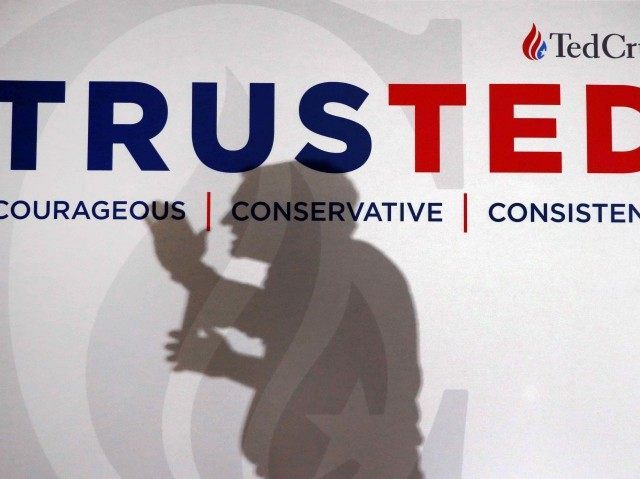The polls say that Sen. Ted Cruz (R-TX) has lost his lead in Iowa to businessman Donald Trump. But the polls in Iowa showed Rick Santorum losing to Mitt Romney in 2012, before he mounted a surprising–and belated–come-from-behind victory.
Cruz has the organization, the data, and the must-win attitude to mount a comeback. Yet even if he does win, he has missed an opportunity to unite the party, beat the media and prepare for the general election.
It was foreseeable that Cruz and Trump would clash before the finish, after Cruz had drafted behind Trump for most of the race. Yet Cruz decided to attack Trump directly, targeting his “New York values,” rather than rising above the fray.
Possibly, Cruz was caught off guard by Trump’s attack on his Canadian birth, a tactic he had expected from the left. Yet even after Trump dismantled that line in the last GOP debate, Cruz has stuck to it, in ads and on the stump.
The consequence is that Cruz has alienated many voters–not just Democrats and independents, but Republicans as well.
New polling data suggest that the “New York values” attack may be backfiring. Some voters, particularly blue-collar males, appear to “double down” on their support for Trump when Cruz attacks him.
People want their president to appeal to everyone, at least in theory. They also want to be a part of something larger than themselves.
Cruz had been improving his favorability ratings among Republicans until “New York values.” The line may be helping him consolidate support among the plurality of voters he needs to win in Iowa–it must be helping at this stage, otherwise he would not keep repeating it–but it will not soon be forgotten elsewhere.
The momentum Cruz would have otherwise had after an Iowa caucus victory will now be undercut by a renewed anti-Cruz backlash.
Cruz also missed an opportunity in the ongoing dust-up about Trump’s participation in the Fox News debate. If he had joined Trump’s protest, given the clear evidence of bias at the network, he would have consolidated the anti-Trump opposition and made a stronger case for the one-on-one debate he is now proposing. He also would have helped Trump end the networks’ practice of setting Republican candidates up for failure on the debate stage.
Instead, Cruz sided with the network. The result is that he will have to share a Trump-less stage with the Iowa also-rans.
The anti-Trump opposition is more splintered than it might have been; the party is more divided than it needs to be; and Cruz’s case in the general election is weaker than it ought to be.
If Cruz does win Iowa–and purely from a commercial perspective, the conservative media should hope that he does–he will have a lot of damage to undo.

COMMENTS
Please let us know if you're having issues with commenting.